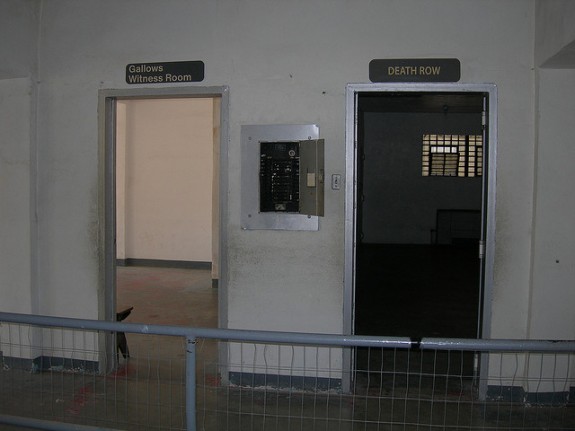
Gov. Rick Scott signed a bill that will speed up executions in Florida. (Photo by Jimmy Emerson.)
By Ashley Lopez
Florida Center for Investigative Reporting
Florida will now quicken the pace of executions in the Sunshine State.
Before boarding a plane to Paris June 14, Gov. Rick Scott signed into a law a bill that will speed up the state’s time frame for executing an inmate who has gone through the appeals process.
The move has garnered national attention and has many taking a close look at Florida’s record of death penalty cases.
As the ACLU of Florida explained in a press release following news that Scott signed the bill: “Florida’s experience has been nearly one exoneree for every three people executed.”
That means one out of every three people almost put to death by the state were later found innocent. Many times in the past, poor legal representations or evidence found late in the appeals proccess was to blame.
Howard Simon, executive director of the ACLU of Florida, said in a statement that “had this law been in effect in the past, innocent people very likely would have been killed.”
Despite calls from groups like the ACLU of Florida, Florida Catholic Conference and the Florida Bar to veto the bill, Scott signed it.
According to the Miami Herald/Tampa Bay Times:
The measure, dubbed “the Timely Justice Act” by its proponents, requires governors to sign death warrants 30 days after the Florida Supreme Court certifies that an inmate has exhausted his legal appeals and his clemency review. Once a death warrant is signed, the new law requires the state to execute the defendant within six months.
…The bill, which passed the House 84-34 and was approved by the Senate 28-10, allows the governor to control the execution schedule slightly because it requires him to sign a death warrant after the required clemency review is completed and only the governor may order the clemency investigation. Scott’s office told lawmakers that because at least 13 of the 404 inmates on Death Row have exhausted their appeals, his office has already started the clock on the clemency review.
If Scott were to sign death warrants for the 13 eligible inmates, and their executions were to continue as planned, he will be on schedule to put to death 21 murderers since he took office in January 2011. The only other recent governor who executed that many people was former Gov. Jeb Bush, who ordered the execution of 21 convicted killers but did it over an eight-year period.
Florida leads the nation in the number of people exonerated while sitting on death row. In the past decade, 24 inmates awaiting execution were freed after courts found that they were wrongfully convicted.
The Herald/Times also reported that the Timely Justice Act “comes at a time when five other states are either repealing or putting a moratorium on executions, and the Florida Supreme Court is conducting a comprehensive review aimed at making more efficient the state’s post-conviction process.”
According to Tampa’s Creative Loafing:
As is so often the case, the Sunshine State is running counter to the nation on this issue. While the number of death sentences has fallen dramatically in recent years elsewhere in the country, Florida has been tops in both 2011 and 2012. Last year, 78 death sentences were issued nationwide, the fewest in 20 years and the second lowest since the U.S. Supreme Court reinstated capital punishment in 1976. But 22 of those sentences were handed down in Florida.
We may be in the running to be the national leader in executions, too. Texas currently boasts this dubious distinction, having executed five people so far this year to Florida’s one (with another scheduled for May 29). But Gov. Scott is signing death warrants at such a rapid pace — five this year, three during a recent span of less than four weeks — that “Florida is on track to pass Texas as the busiest, bloodiest execution state,” says Mark Elliott of Floridians for Alternatives to the Death Penalty, “and Governor Scott’s legacy would become the most executing governor in Florida’s history.”
Florida also remains an outlier when it comes to allowing capital case juries to recommend a death sentence by a simple 7-5 majority. A bill sponsored in the Senate by Orlando Democrat Darren Soto and Melbourne Republican Thad Altman would have changed that to a unanimous jury vote in the penalty phase of a murder trial, but it failed to pass.
